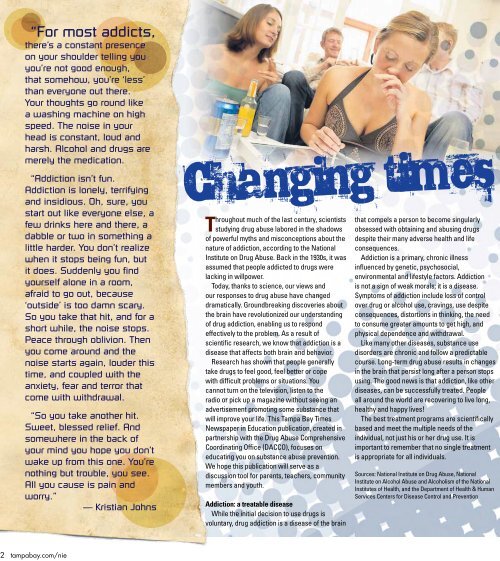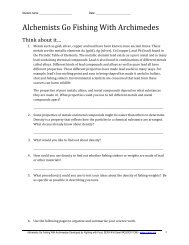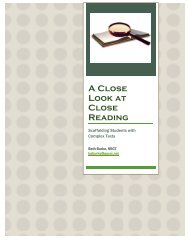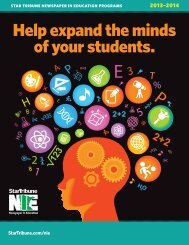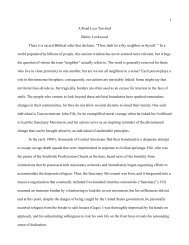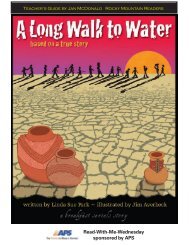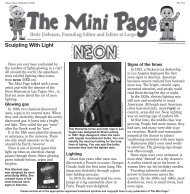“For most addicts,there’s a constant presenceon y<strong>our</strong> shoulder telling youyou’re not good enough,<strong>that</strong> somehow, you’re ‘less’than <strong>every</strong>one out there.Y<strong>our</strong> thoughts go round likea washing machine on highspeed. The noise in y<strong>our</strong>head is constant, loud <strong>and</strong>harsh. Alcohol <strong>and</strong> drugs aremerely the medication.“Addiction isn’t fun.Addiction is lonely, terrifying<strong>and</strong> insidious. Oh, sure, youstart out like <strong>every</strong>one else, afew drinks here <strong>and</strong> there, adabble or two in something alittle harder. You don’t realizewhen it stops being fun, butit does. Suddenly you findy<strong>our</strong>self alone in a room,afraid to go out, because‘outside’ is too damn scary.So you take <strong>that</strong> hit, <strong>and</strong> for ashort while, the noise stops.Peace through oblivion. Thenyou come around <strong>and</strong> thenoise starts again, louder thistime, <strong>and</strong> coupled with theanxiety, fear <strong>and</strong> terror <strong>that</strong>come with withdrawal.“So you take another hit.Sweet, blessed relief. Andsomewhere in the back ofy<strong>our</strong> mind you hope you don’twake up from this one. You’renothing but trouble, you see.All you cause is pain <strong>and</strong>worry.”— Kristian JohnsChanging timesThroughout much of the last century, scientistsstudying drug abuse labored in the shadowsof powerful myths <strong>and</strong> misconceptions about thenature of addiction, according to the NationalInstitute on Drug Abuse. Back in the 1930s, it wasassumed <strong>that</strong> people addicted to drugs werelacking in willpower.To<strong>day</strong>, thanks to science, <strong>our</strong> <strong>views</strong> <strong>and</strong><strong>our</strong> responses to drug abuse have changeddramatically. Groundbreaking discoveries aboutthe brain have revolutionized <strong>our</strong> underst<strong>and</strong>ingof drug addiction, enabling us to respondeffectively to the problem. As a result ofscientific research, we know <strong>that</strong> addiction is adisease <strong>that</strong> <strong>affect</strong>s both brain <strong>and</strong> behavior.Research has shown <strong>that</strong> people generallytake drugs to feel good, feel better or copewith difficult problems or situations. Youcannot turn on the television, listen to theradio or pick up a magazine without seeing anadvertisement promoting some substance <strong>that</strong>will improve y<strong>our</strong> life. This Tampa Bay Times<strong>News</strong>paper in Education publication, created inpartnership with the Drug Abuse ComprehensiveCoordinating Office (DACCO), focuses oneducating you on substance abuse prevention.We hope this publication will serve as adiscussion tool for parents, teachers, communitymembers <strong>and</strong> youth.Addiction: a treatable diseaseWhile the initial decision to use drugs isvoluntary, drug addiction is a disease of the brain<strong>that</strong> compels a person to become singularlyobsessed with obtaining <strong>and</strong> abusing drugsdespite their many adverse health <strong>and</strong> lifeconsequences.Addiction is a primary, chronic illnessinfluenced by genetic, psychosocial,environmental <strong>and</strong> lifestyle factors. Addictionis not a sign of weak morals; it is a disease.Symptoms of addiction include loss of controlover drug or alcohol use, cravings, use despiteconsequences, distortions in thinking, the needto consume greater amounts to get high, <strong>and</strong>physical dependence <strong>and</strong> withdrawal.Like many other diseases, substance usedisorders are chronic <strong>and</strong> follow a predictablec<strong>our</strong>se. Long-term drug abuse results in changesin the brain <strong>that</strong> persist long after a person stopsusing. The good news is <strong>that</strong> addiction, like otherdiseases, can be successfully treated. Peopleall around the world are recovering to live long,healthy <strong>and</strong> happy <strong>lives</strong>!The best treatment programs are scientificallybased <strong>and</strong> meet the multiple needs of theindividual, not just his or her drug use. It isimportant to remember <strong>that</strong> no single treatmentis appropriate for all individuals.S<strong>our</strong>ces: National Institute on Drug Abuse, NationalInstitute on Alcohol Abuse <strong>and</strong> Alcoholism of the NationalInstitutes of Health, <strong>and</strong> the Department of Health & HumanServices Centers for Disease Control <strong>and</strong> Prevention2 tampabay.com/nie
HillsboroughPreventionCollaborativeIn November 2010, several local leadersin Hillsborough County, Florida, formed theHillsborough Prevention Collaborative (HPC) towork together to deal with community <strong>issues</strong>such as alcohol <strong>and</strong> drug abuse, violence, ganginvolvement, teen pregnancy, school failure,youth crime <strong>and</strong> obesity.The HPC has had participation fromthe Hillsborough County Board of CountyCommissioners, the Children’s Board ofHillsborough County, Hillsborough CountyPublic Schools, the Hillsborough CountySheriff’s Office, the Central Florida BehavioralHealth Network, the Florida Department ofChildren <strong>and</strong> Families Suncoast Region, theU.S. Attorney’s Office Middle District, the FamilyJustice Center, DACCO, Mental Health CareInc., ACTS, the Mendez Foundation, the Centre,Boys <strong>and</strong> Girls Clubs of Tampa Bay, the CrisisCenter of Tampa Bay, Bay Area Youth Services,Success 4 Kids <strong>and</strong> Families, the Child AbuseCouncil, Hillsborough Kids Inc., the HealthyStart Coalition, the Hillsborough Healthy TeenNetwork, the Florida Institute for CommunityStudies, St. Joseph’s Children’s HospitalAdvocacy Center, Abe Brown Ministries <strong>and</strong>Beulah Baptist Institutional Church.Community members, including students,parents, schools, churches <strong>and</strong> businesses,can work with the Hillsborough PreventionCollaborative to make sure health, wellness<strong>and</strong> success are promoted in all aspects ofcommunity life – family, friends, school, work,social, business, neighborhoods <strong>and</strong> so on. Thiscan be done through activities <strong>that</strong>• raise awareness about health <strong>and</strong> theprevention of illegal drug use, underagedrinking, prescription drug abuse, violence<strong>and</strong> failing school• promote healthy individual, neighborhood,school <strong>and</strong> family relationships• provide information to community membersso they can make positive choices• try to change parts of the communityenvironment <strong>that</strong> promote unhealthy orunsafe choicesThere are many ways you can getconnected with the Hillsborough PreventionCollaborative. Visit us at https://sites.google.com/site/hillsboroughprevention/, e-mail us athillsboroughprevention@gmail.com, or look forus on Facebook.Drug Abuse Comprehensive Coordinating OfficeThe Drug Abuse Comprehensive Coordinating Office’s(DACCO) mission is to work for a drug-free community– one person, one family at a time. DACCO reachesHillsborough County residents through communityeducation, prevention, assessment <strong>and</strong> referrals,support services, intervention, <strong>and</strong> outpatient <strong>and</strong>residential treatment.Research shows <strong>that</strong> the use of alcohol, tobacco <strong>and</strong>other drugs is associated with specific aspects of ayoung person’s community, school, family environment<strong>and</strong> individual characteristics. These aspects arecalled risk or protective factors. Effective preventionprograms identify which risk factors are elevatedin the community <strong>and</strong> which protective factors aresuppressed, <strong>and</strong> then implement programming <strong>that</strong>specifically targets those factors.Prevention strategies include education onsubstance abuse <strong>and</strong> its risk, as well as short-termactions focused on changing individual behavior.Environmental prevention strategies involve long-term,potentially permanent changes <strong>that</strong> have a broaderreach. The most effective prevention plans will use bothenvironmental <strong>and</strong> individual prevention strategies.Working in various locations, DACCO educates youth,adults <strong>and</strong> families about preventing substance abuse.Now in its third year, the DACCO-led Community AlcoholPrevention Grant Collaborative is targeting youngadults through a countywide educational campaign<strong>that</strong> highlights state laws, campus alcohol policies, thenature of blood alcohol concentration <strong>and</strong> the needto self-monitor alcohol use. Partners in this initiativeinclude the University of South Florida, the Universityof Tampa, 10 Connects CBS Tampa Bay <strong>and</strong> the TampaBay Times.DACCO provides a range of treatment servicesfor individuals <strong>and</strong> families in need. DACCO treatssubstance use disorders in outpatient <strong>and</strong> residentialsettings <strong>and</strong> addresses co-occurring mental health<strong>issues</strong>, such as anxiety, depression <strong>and</strong> post-traumaticstress disorder (PTSD).DACCO offers supportive services to help clientsstay engaged in treatment, meet all their health careneeds <strong>and</strong> improve their <strong>lives</strong>, including HIV testing <strong>and</strong>counseling, adult education/GED, primary health care,<strong>day</strong> care <strong>and</strong> affordable housing. DACCO offers bothoutpatient <strong>and</strong> adult residential treatment programs.Both outpatient <strong>and</strong> residential programs includedifferent intensities of individual, group <strong>and</strong> familycounseling; on-site NA/AA meetings; life skillseducation; <strong>and</strong> urine drug screening. To schedule anassessment of patient needs, call 813-984-1818, ext. 0.To learn more about DACCO’s services, visitdacco.org <strong>and</strong> click on “Community Education” tolearn more about substance abuse.tampabay.com/nie 23


